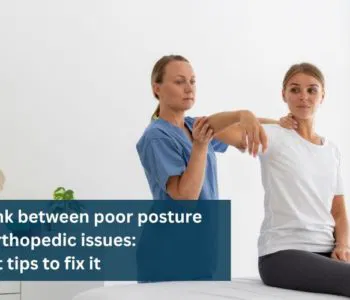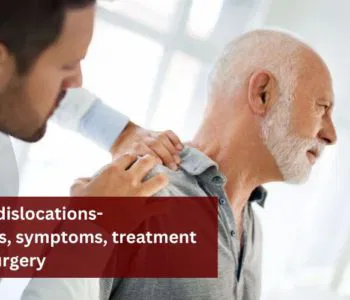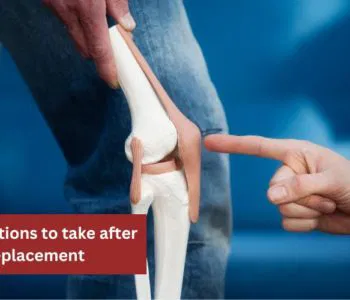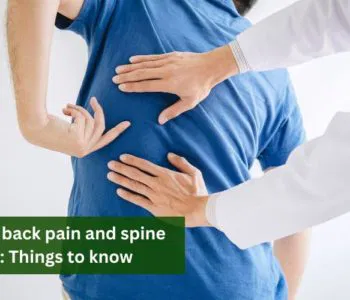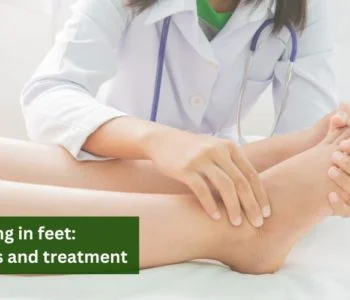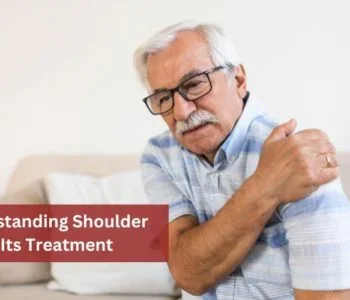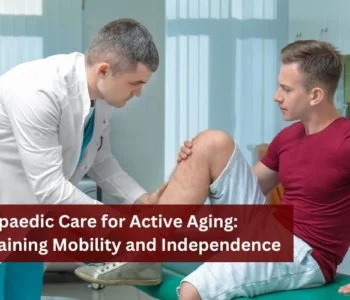Things to know about herniated disc and when to see an orthopedic doctor
 Orthopaedic
Orthopaedic
Things to know about herniated disc and when to…
A disc is found between each of the backbones in your spinal cord, which also acts as a shock absorber and helps to cushion the bones. When the outer ring of a disc herniates or tears and pushes over into the spinal canal it’s called a herniated disc. Nevertheless, it can happen anywhere along your spine even in your neck but most commonly occurs in the lower part (lumbar vertebrae).
You can get a herniated disk by lifting something incorrectly or suddenly twisting your back. Some other causes include obesity and degeneration due to disease or age.
Though not all herniated discs are painful, sometimes they may compress one of your nerves causing pain within the back or legs (sciatica). The pain from this condition may radiate down the shoulder and arm if it is in the neck area. Besides pains, there will be loss of sensation, tingling and weakness due to a prolapsed intervertebral disc.
Continue reading to find out more about herniated discs; their causes and symptoms; when it could be required to visit an orthopedic surgeon in Ludhiana.
Causes, symptoms, and diagnosis of herniated disc
Causes
- A herniated or slipped disk may occur when a portion of the soft internal nucleus of a spinal disk protrudes through a crack in the disk’s fibrous lining.
- This occurrence is most frequently observed in the lumbar region, although it is also possible in the cervical and thoracic regions of the spinal column.
- The cause of a herniated disk typically involves a gradual deterioration and excessive strain due to repetitive motion over an extended period.
- In older people, spinal disks tend to dehydrate and weaken, thus increasing the likelihood of a herniated disk occurrence.
- Certain medical conditions, such as spinal stenosis and connective tissue disorders, may elevate the risk of disk herniation.
Symptoms of herniated disc
- The symptoms related to herniated discs usually include when the disc is exerting pressure on a nerve, leading to weakness, numbness, and pain in the affected nerve, commonly resulting in back discomfort.
- Individuals with a herniated disk in the lower back may experience discomfort in the buttocks, thigh, and calf, potentially extending to parts of the foot.
- Conversely, those with a herniated disk in the neck may primarily feel pain in the shoulder and arm.
- If the herniated disc is not exerting pressure on a nerve, it is possible that you may encounter minimal to negligible symptoms.
Diagnosis
Diagnosis of a herniated disc usually involves a primary care doctor conducting a comprehensive examination.
Medical history
- During the complete medical history, the doctor will inquire about details such as the nature of the pain, any previous medical conditions, your line of work, your personal medical history as well as your family’s medical history.
Physical Exam
- As part of the physical exam, your orthopedic surgeon will check how well you can walk, the strength of your muscles, your reflexes and whether you can feel light pinpricks.
Diagnostic testing
- Herniated discs cannot be detected by X-rays, but an X-ray may be ordered to rule out infections or other spinal issues.
- CT scans provide more detailed images along with multiple views that help in diagnosing a lumbar herniated disc.
- In some cases, an MRI will be used to localize the herniated disc and evaluate its impact on nerve structures.
- Myelogram is a diagnostic imaging procedure where an x-ray is obtained following the injection of contrast dye into the spinal canal space. This is done to establish whether there is compression exerted on the spinal cord by herniated discs or any other causes that result in clinical conditions.
Treatment
Medications
Nonprescription pain medicines
- If experiencing mild to moderate pain, your healthcare provider may suggest over-the-counter pain medication options such as acetaminophen (Tylenol, others), ibuprofen (Advil, Motrin IB, others), or naproxen sodium (Aleve)
Neuropathic medicines
- Medicines such as gabapentin, pregabalin, duloxetine, and venlafaxine, are utilized to reduce pain by affecting nerve gently.
Muscle relaxers
- These medications may be recommended in the event of muscle spasms.
- It is important to note that sedation and dizziness are frequently experienced as side effects.
Injections
- If the pain does not show improvement with medication, your orthopedic surgeon may suggest a corticosteroid injection.
- This medication can be administered around the spinal nerves, with the assistance of spinal imaging to accurately guide the needle placement.
Therapy
- Your healthcare professionals may recommend physical therapy as a method to alleviate your pain.
- Skilled physical therapists will demonstrate positions and exercises tailored to reduce the discomfort associated with a herniated disk.
Surgery
- Few people with herniated disks will need to undergo surgery.
- If non-invasive therapies do not alleviate your symptoms within six weeks, surgery may be considered.
In many cases, patience, time, and medication can help alleviate herniated disc pain; however, certain symptoms may require medical intervention. If you encounter severe symptoms, it is imperative that you promptly reach out to an orthopedic surgeon in Ludhiana.
